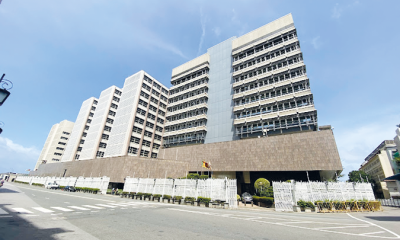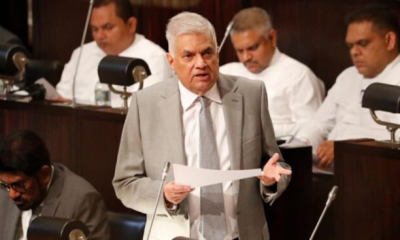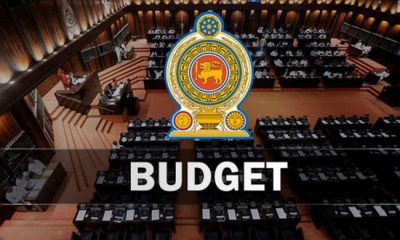Features
Budget, Taxation Turmoil and Policy Blunders – Part II
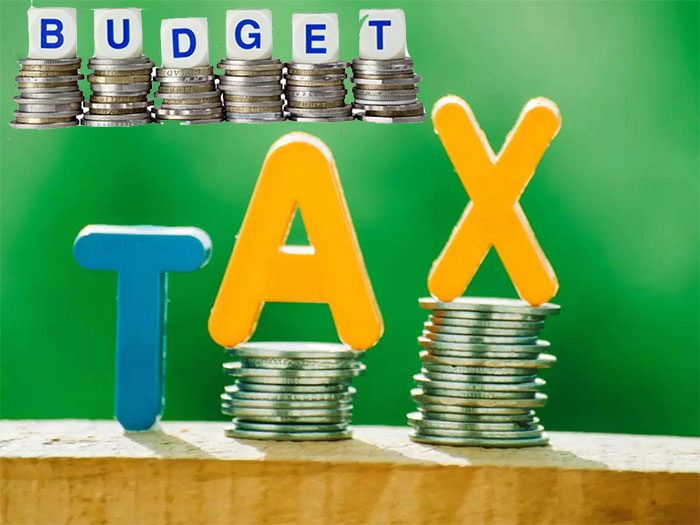
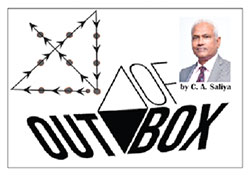 Last week, we delved into a significant event in New Zealand, where a group of affluent individuals expressed a willingness to voluntarily pay more taxes, only to have the tax authority reject their offer. This incident prompts questions about the fairness of the current tax system, particularly in relation to the lower tax rates paid by the wealthiest citizens. Drawing parallels with Sri Lanka, the discussion advocates for the implementation of mandatory Tax Identification Numbers (TINs) in developing economies, underlining the necessity for a more equitable tax system.
Last week, we delved into a significant event in New Zealand, where a group of affluent individuals expressed a willingness to voluntarily pay more taxes, only to have the tax authority reject their offer. This incident prompts questions about the fairness of the current tax system, particularly in relation to the lower tax rates paid by the wealthiest citizens. Drawing parallels with Sri Lanka, the discussion advocates for the implementation of mandatory Tax Identification Numbers (TINs) in developing economies, underlining the necessity for a more equitable tax system.
We observed a unique situation in Sri Lanka where, despite per capita GDP growth, the tax-to-GDP ratio has been on a decline. The introduction of some naïve tax policies, such as the abolition of mandatory PAYE Tax, the increase in tax and VAT allowances, in 2019/2020, were also discussed.
The projection for Sri Lanka’s tax revenue as a percentage of GDP is expected to rise from 7.3% in 2022 to 12.1% in 2024, with the World Bank emphasizing the importance of maintaining tax revenues above 15% of GDP for economic growth. Projections for Sri Lanka’s GDP per Capita indicate a gradual increase over the next few years, reaching around US$4098.00 in 2025.
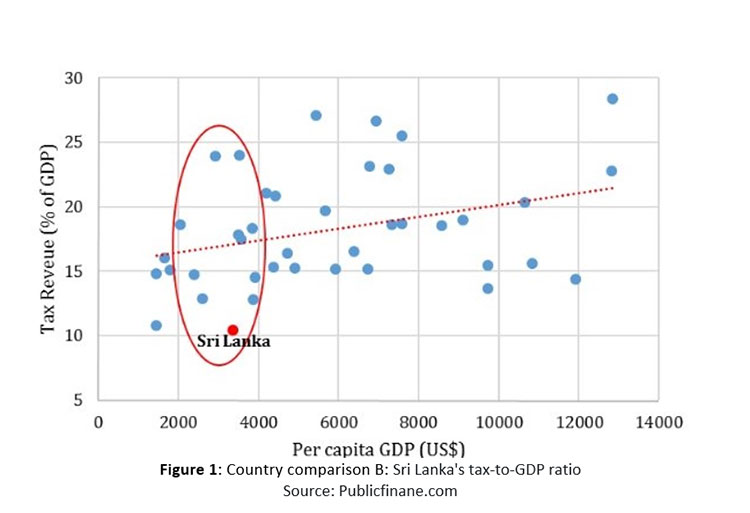
Sri Lanka compared
According to a map available on the Internet, depicting global comparison of Tax-to-GDP ratio, Sri Lanka is bracketed with several economically challenged African nations as well as Afghanistan and Bangladesh within its region. Notably, it ranks lower than many neighbouring countries including India, Nepal, Bhutan, Pakistan, and Indonesia etc.
On the contrary, countries with higher income levels, such as US, UK, Australia and any European countries, demonstrate considerably elevated tax-to-GDP ratios, ranging from 20% to 30%, and, in some cases such as UK France, the Netherlands, New Zealand and Denmark, reaching as high as 40% to 45%.
Figure 1 plots countries based on their GDP per capita and tax revenue as a percentage of GDP. Countries with income levels like Sri Lanka (ranging between US $2,000-4,000) are highlighted within the circle. Sri Lanka’s tax-to-GDP ratio falls significantly below the average. For instance, Morocco and Georgia, with GDP per capita figures of US $2,931 and US $3,529, respectively—comparable to Sri Lanka’s GDP per capita of US $3,369—both countries collect 24 percent of GDP as tax revenue, whereas Sri Lanka collects only 11 percent.
The tax revenue as a percentage of GDP for middle-income countries has shown a relatively stable trend over the years. The values range from around 10.7% in 2005 to an expected 11.4% in 2024 (Forecast).
Sri Lanka’s tax revenue as a percentage of GDP has experienced fluctuations during the period. Notable peaks are observed in 2006, 2007, and reaching up to 14.6% in 2015 and was par with the Middle-Income countries, followed by a decline again from 2019. The values have varied, with a dip to 7.8% in 2021, indicating a substantial decrease. Projections for 2022 and 2023 show a gradual increase, with the budget for 2024 aiming at a significant rise to 12.1%. (See Figure 2).
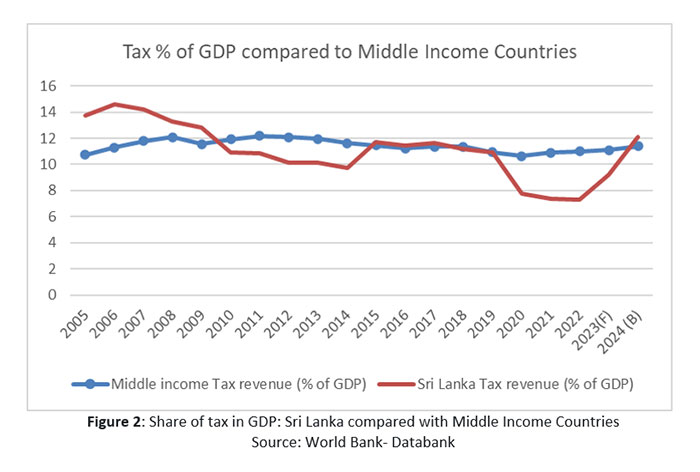
Hence, the tax revenue for Sri Lanka, while exhibiting fluctuations, generally appears to be on a recovery path after a notable decline in recent years. The budgeted figure for 2024 suggests an ambitious target, aiming for a substantial increase in tax revenue as a percentage of GDP.
Not only arbitrage but
also corruption
In countries like the United States, income tax stands out as the primary revenue source. This is facilitated by nearly zero import duties, typically set at 5 percent or less, and the absence of a value-added tax (VAT). In contrast, Europe relies heavily on a value-added tax, often around 20 percent, but does not impose import duties. In Sri Lanka, despite the relatively high import duties borne by the average citizen, the government only receives a fraction of this revenue. This is a result of the diversion of substantial sums to domestic protectionists through the practice of tax arbitrage, coupled with instances of tax avoidance (commonly referred to as tax minimization) and evasion, often involving manipulations and collusion.
Tax arbitrage involves exploiting differences in tax policies or rates across different jurisdictions to gain a financial advantage. In the context of domestic protectionists, individuals or entities within a country capitalize on tax differences among regions. This strategy often involves the strategic use of tax regulations or loopholes to minimize or entirely avoid tax liability. Notably, corruption plays a crucial role in this dynamic. Given the prevalent culture of corruption, extending from the top echelons of the state to even lower-level positions in Sri Lanka, these tactics can be readily implemented by astute business individuals, both on a large and small scale.
Not only anomaly but
also corruption
A noteworthy aberration in Sri Lanka’s tax structure is its disproportionate reliance on taxes related to international trade for tax revenue in comparison to its income level. Global patterns indicate that the proportion of taxes on imports as a share of total tax revenue tends to decrease as income levels rise. For instance, a study by Loewy, titled ‘Taxation: 21st Century Issues and Challenges’, revealed that trade taxes contribute to approximately 25% of total tax revenue in low-income countries, 12% in lower-middle-income countries, 9% in upper-middle-income countries, and less than one percent in high-income countries.
Contrary to these trends, in Sri Lanka’s case, taxes imposed solely on imports constitute nearly 20% of the government’s total tax revenue—a significantly high figure for a lower-middle-income country (Figure 3). The country’s substantial reliance on international trade for tax income has proven to be a risky proposition for the government. While restricting imports is essential to address the trade deficit, it comes at the cost of reduced government revenue and an exacerbated budget deficit. Conversely, increasing imports would boost government revenue but intensify the trade deficit. Consequently, a strategic shift away from trade-related taxes becomes crucial for the government to generate revenue without destabilizing the country’s macroeconomic environment.
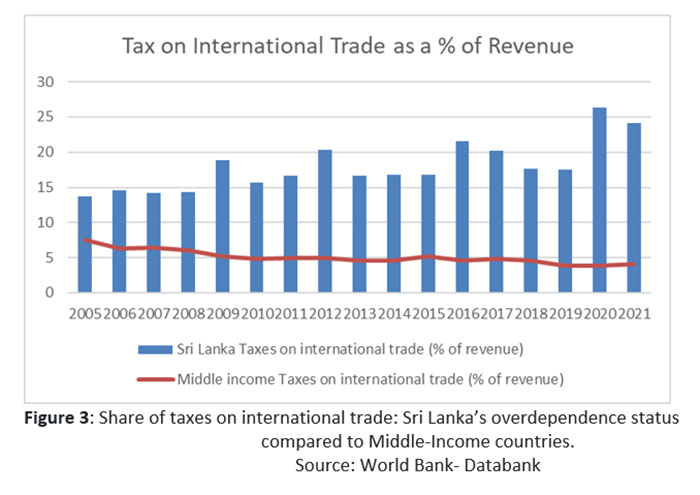
Share of expenses on government servants
Government spending in Sri Lanka was 48% in 2019 to public sector salaries and pensions but now only 44% allocated for 2024 as mentioned before. In the most recent budget presentation, over 35% of government expenditure was directed towards public sector salaries, pensions, and public welfare, emphasising their importance in government spending. In a specific breakdown, it is mentioned that Rs. 92 billion was allocated to pay the salaries of public sector employees in July 2022. Moreover, a historical perspective indicates the significance of government spending on salaries, dating back to 1950. Overall, public sector salaries and pensions play a crucial role in Sri Lanka’s government expenditure, reflecting a substantial commitment to the welfare of government employees.
Another anomaly is too many armed forces
Sri Lanka’s armed forces strength of 317,000 personnel is financially unsustainable because of its considerable annual expenditure of Rs.423 billion (410 in 2023), which is 1.88% of the GDP. Comparisons with other nations, including Australia and the Netherlands, reveal significantly smaller military forces. Sri Lanka’s post-civil war armed forces maintenance highlights the country’s unique revenue-based fiscal consolidation strategy, focusing on tax increases without traditional cost-cutting measures.
Conclusions
This analysis reveals three main anomalies in Sri Lanka’s tax structure, including a decline in taxpayers after significant tax cuts. The essay emphasizes the importance of sustaining tax revenues for economic growth and explores the country’s tax-to-GDP ratio, positioning it against global comparisons (over 15% of GDP). Notably, it highlights the overdependence on international trade taxes, the disproportionate spending on government servants, and the financial challenges posed by the substantial size and expenditure on the armed forces. The narrative suggests a need for strategic reforms to navigate the intricate fiscal landscape.
(The writer, a senior Chartered Accountant and professional banker, is Professor at SLIIT University, Malabe. He is also the author of the “Doing Social Research and Publishing Results”, a Springer publication (Singapore), and “Samaja Gaveshakaya (in Sinhala). The views and opinions expressed in this article are solely those of the author and do not necessarily reflect the official policy or position of the institution he works for.)
Features
Shame! Ragging raises its cowardly head again

Ragging at Sabaragamuwa university has resulted in the loss of another student’s life and there is another incident of barbaric attack on an anti-rag student of J’pura university by some students from the same university. Whether the bullies are backed by political parties or not, they show their undeveloped and conformist minds that need urgent refinement; if they are connected to political parties and student unions, the latter show only their vulgarity and duplicity when they wax eloquent about modern education, culture, decadent politics, human rights, corruption and all that jazz. That this barbarous practice continues in broad daylight and under the very nose of university and law enforcement authorities is deplorable and puzzling to say the least. It is ironic that the best minds, the superstars in academia, the leading lights in education and the guardians of all that is progressive have become helpless spectators of this bullying happening in their universities. The ignominious records of rag victims in our country are a crying shame as all those perpetrators have been from that somewhat musty and largely conservative ‘cream of intelligence’ as they are called at all inauguration ceremonies where their egos are pampered.
Ragging in our universities is a sure sign of the backwardness of our culture and education, in comparison with that of civilized societies. The brutal practice of ragging shows that education in our country, both in schools and universities, has a lot of room for improvement about making the undergraduate population sensitive and sensible, more than ‘educated’. Of course, we can understand torture if it is something which happens in the underworld or in any place where the new recruits must be brutaliesed before they are admitted to their circles, but how can one understand when it happens in the highest seats of academia? Professor O. A. Ileperuma has, in his article “Ragging and loss of life” published in The Island of 5 May 2025, stated that some academics turn a blind eye to ragging perhaps “because they themselves were raggers in the past and see nothing harmful in such sordid instances of ragging”. This is pathetic and may perhaps prove some of the accusations that have been made ad nauseum about the lack of a wholesome education in our university system, which is said to be obsessed with mass producing ‘employable graduates’.
As they say, desperate times call for desperate measures. As far as the ragging culture in our universities is concerned, desperate measures are long overdue. In the highest institutes of learning where knowledge is produced and all the progressive and advanced ideas are supposed to be generated, there has been unfathomable brutality, crudeness and conventionality in the name of an acquired beastliness which they call ‘ragging’ to give it a quasi-academic smell when all it amounts to is lack of refinement which can be linked to numerous reasons.
Most of the culprits are the victims of a system which esteems hierarchy where it is accepted that superiority is synonymous with repressive power and inferiority is another term for meekness and passive acceptance of all commands coming from above. It is a mentality which is based on the warped logic that superiority is absurd if the seniors have no right to snub the juniors. Those who have tasted humiliation in one form or another for long due to reasons inherent in society can grow up to be vengeful. Most of these diehard raggers often show signs of this mentality in the way they behave the minute they have been automatically lifted to their pathetic superiority after one year in the university where they enjoy a mistaken sense of immunity from the law. The widely publicised idea of ‘freedom’ associated with universities and their relative aloofness from the rest of society and the aura they have acquired have made them safe havens for the raggers if the unmitigated brutality in ragging over the long years is any indication. The question is why (oh why?) these learned bullies despise civilised behaviour so much in their enclaves of power merely on the strength of one year’s seniority. If it is their one year’s accumulated knowledge which makes them feel superior to the newcomers in an aggressive way, surely, such knowledge is questionable, which must intrigue educationists, psychologists, sociologists and all academics interested in the role of education in character building.
Raggers have been saying ad nauseam that ragging is given to make the new entrants tough enough for academic work. As we know their methods include using foul language, humiliation, intimidation, physical and psychological abuse, torture, beating and forcing rigorous exercises even leading to death. The resultant trauma has led some to commit suicide. All this is done to help the new students with a proven capacity for hard work in the academic field!
However, there are some pertinent questions to be asked. Is this method of building resilience of potential academics backed by research? Should this ‘programme’ be conducted by senior students (who are apparently mentally unsound)? Aren’t there better qualified people to conduct a civilised programme which would help make the newcomers ready to face the trials of academic life? Do they believe that no refined programme can be as ‘effective’ as their ragging? Why should they spend their valuable time doing it when it can be done by experts in a more organised and civilised manner? Have they ever been cultured enough to discuss this so-called ‘personality development’ programme with the relevant authorities and academics, with any reliable evidence to prove its effectiveness?
As we know, these raggers who are self-appointed ‘experts’ in character building of sorts expect total submission from the juniors they try to brutalise, and those who dare resist this bullying are viciously suppressed. To what extent does this compulsory compliance expected from the new students at the beginning of their academic career help them to be better undergrads?
How much more brutality in ragging is to be endured by the new university entrants for “desperate measures” to be called for?
by Susantha Hewa
Features
80th Anniversary of Second World War

One of the most important dates in World War II, is May 9, 1945, when the Soviet red flag with the hammer and sickle emblem was raised over the Reichstag building, the German parliament. This confirmed Germany’s unconditional surrender to the Soviet Union. Since then, 80 years have passed upto May 9, 2025. It is very timely to look back on the past 80 years of history, and to briefly discuss some of the current issues and the future.
Beginning and End of the 2nd World War
World War II began on September 1, 1939, when Nazi Germany attacked Poland. Within a year of the war, the world’s imperialist powers had divided into two camps. Germany was on one side, targeting Europe, Italy Africa, and Japan Asia, while Great Britain, the United States, and France were on the other side of the war.
Within a short time from the start of the war, Germany had conquered many countries in Europe, and on June 22, 1941, Nazi Germany attacked the Soviet Union. The Soviet Union joined the anti- Nazi Allies and launched the “Great Patriotic War” to defend the world’s first socialist state, and progressive forces around the world acted in a way that supported the Soviet Union.
Three major battles known as the Battles of Moscow, Stalingrad, and Kursk turned the tide of World War II, shattering Hitler’s dream of capturing Moscow in a few months (4 months) through Operation “Barbarossa” and celebrating the victory from Red Square. By the beginning of 1945, the entire Soviet Union had been liberated from Nazi Germany, and by March 1945, the Soviet Red Army had surrounded Berlin from the east, south, and north, and then surrounded the entire city, surrendering the German forces, ending the European War of World War II on May 9.
World War II was a major war in which 61 countries, representing 89% of the world’s population participated, and the total number of deaths in this war was 50 million, of which 25-30 million were Soviet citizens. The Soviet Red Army, which ended the Great War for the Liberation of Europe on May 9, 1945, entered the Battle of Manchuria three months later on August 9, 1945, and defeated imperialist Japan. By then, the United States had dropped atomic bombs on Hiroshima and Nagasaki (on August 6 and 9). Thus, the Soviet Union played the major role in defeating the fascist military coalition, including Nazi Germany, during World War II.
Post-World War order
Negotiations, to shape the post-war world order, began while World War II was still ongoing. In talks held in Washington in January-February 1942, in Canada in 1943, later in Moscow, and in Tehran, Iran in November-December 1943, the Soviet Union, the United States, Great Britain, and China agreed to establish an international organisation with the aim of preserving world peace. Later, the Soviet, American and British leaders who met in Yalta in Crimea agreed on the structure of the United Nations, the Security Council, and the veto power, and the United Nations Charter, signed by 50 countries in San Francisco in 1945, came into force on October 24, 1945.
Rise of Socialist world and collapse of colonialism
With the Soviet victory in World War II, the world underwent unprecedented changes. Although Mongolia was the only socialist state other than the Soviet Union at the start of World War II, after that war, Czechoslovakia, Poland, Romania, Bulgaria, Hungary, Yugoslavia, and Albania in Eastern Europe also became socialist countries. The Democratic Republic of Vietnam was established in 1945, and in 1947 a socialist state was established in East Germany under the name of the German Democratic Republic. The Chinese Revolution triumphed in 1949, and the Cuban Revolution triumphed in 1959. Thus, the socialist system established in a single country by the October Revolution in 1917 developed into a world system against the backdrop of the unique victory of the Soviet Union in World War II.
Another direct result of the victory in World War II was the collapse of the colonial system. National liberation struggles intensified in Asia, Africa and Latin America, and new independent countries emerged one after another on these continents. In the 25-30 years that followed the end of World War II, the colonial system almost completely collapsed. The United Nations, which began with 50 member states, now has 193 members.
With the end of World War II, working class struggles intensified. Communist parties were formed all over the world. Although the Sri Lankan working people’s movement was in a state of truce during World War II, the war ended in May 1945 and by August it had gone on a general strike. The 8-hour workday, wage boards, holiday systems and monthly salary systems were won through that struggle. The working class movement in this country was able to win many rights, including pension rights, overtime pay, and other rights, through the general strike held in 1946. Although the general strike of 1947 was suppressed, there is no doubt that the British government was shocked by this great struggle. In the elections held in 1947, leftist and progressive groups were elected to parliament in large numbers, and independence with Dominion status was achieved in 1948.
World is in turmoil
Until this era, which is 80 years after the end of World War II, the world has so far managed to prevent another world war. Although there have been no world wars, there have been several major conflicts around the world. The ongoing Middle East conflict over the forced displacement of the Palestinian people, the conflict created by Western powers around Iran, the Russia-Ukraine conflict, and the recently escalating Indo-Pakistan conflict are among them. The limited military operation launched by Russia to prevent the NATO organization reaching its borders, has transformed into a battle between Russia and the collective West. But the conflict now seems to have entered a certain path of resolution.
Several parties have launched trade wars that are destabilising the world, perhaps even escalating into a state of war. Thousands of trade sanctions have been imposed against Russia, and the US President has declared a trade war by imposing tariffs on dozens of countries around the world.
Meanwhile, the world has not yet been able to provide a satisfactory solution to the problem of global warming, which has threatened the existence of the entire human race.
The Bretton Woods Organizations (International Monetary Fund and World Bank), which were economic operating institutions established after World War II, have not only failed to lead the world’s economic development, but there is a strong allegation that the guidance of those institutions has exacerbated the economic problems of newly independent countries.
At this time of commemoration of the 80th anniversary of World War II, it is our responsibility to resolve the above problems facing the people of the world and to dedicate ourselves to the future of humanity.
Way forward
Accordingly, a futuristic, new economic order is emerging, and a multipolar world has been formed. The most important point to emphasise here is that the world order that was established after World War II, which encompasses various fields, is a system jointly developed by the great powers that won that war, and the reforms that need to be made in accordance with the demands to change this world order to suit the current reality must be identified collectively. No single country can change these world structures.
People are rallying all over the world for issues related to the survival of the entire human race, such as controlling global warming. New programmes that contribute to the economic development of most countries in the world have been or are being developed. The New Silk Road projects, the BRICS organisation, the New Development Bank, the Asian Infrastructure Investment Bank, and the Shanghai Cooperation Organization are such programs/new institutions. A global process has been launched to prevent a nuclear war and maintain world peace.
Many of the above-mentioned issues and problems have arisen through imperialist military and economic planning and operations, and therefore, the contradiction between imperialism and the people has become the main contradiction of this era. Therefore, it must be emphasized on the 80th anniversary of the Second World War that the way forward in the world will be through the people’s struggle against imperialism.
by Dr. G. Weerasinghe
General Secretary, Communist
Party of Sri Lanka
Features
New Mayors; 80th Anniversary of VE Day; Prince Harry missteps yet again

 This week’s Cry is put together as the voting goes on for mayors of Municipal Councils. Cass is rather confused about this second tier of government, so she googled and here is what she got: “There are currently 29 municipal councils in Sri Lanka. These councils govern the largest cities and first tier municipalities in the country. The local government system also includes 36 urban councils and 276 Pradeshiya Sabhas.” Not that this has made matters clearer to Cass.
This week’s Cry is put together as the voting goes on for mayors of Municipal Councils. Cass is rather confused about this second tier of government, so she googled and here is what she got: “There are currently 29 municipal councils in Sri Lanka. These councils govern the largest cities and first tier municipalities in the country. The local government system also includes 36 urban councils and 276 Pradeshiya Sabhas.” Not that this has made matters clearer to Cass.
She believes that for a small country of 22 m people, we are too heavily governed from above, with a central government and then all these councils and sabhas below. Consider the number employed in them; most underworked and underworking. Another matter is that if you want a matter seen to, regarding property rates, etc., you are most often sent from this Sabha to that council.
This came about with the 13th Amendment to the Sri Lanka Constitution introduced on November 14, 1987, following the Indo-Sri Lanka Accord, which aimed to address the ethnic conflict by granting some autonomy to provincial councils. As Cass believes it was imposed on us by India after the threat expressed by India, instigated by Tamil Nadu, when Prabhakaran in his military childhood, was cornered and almost captured in Vadamarachchi.
India rained parippu on the northern peninsular, demanded no arrests of LTTE; and it was rumoured Indian forces were poised on the southern and south eastern coasts of the subcontinent ready to sail to war to the island below them. PM Rajiv Gandhi came instead; Prez JRJ was constrained to meet, greet and honour him. One rating in a guard of honour which handsome Rajiv inspected, expressed the majority people’s opinion; “We don’t want you here!” After which guards of honour worldwide are kept strictly at a safe distance from the VVIP honoured.
To Cass the most important fact of the election progressing now and its outcome is that she hopes newly elected mayors will insist on the Municipal Councils’ employees doing the work allotted to them: mostly garbage collectors; sprayers against mosquitoes; PHIs inspecting kitchens of eating houses and those in charge of general cleanliness of cities keeping s clean.
Complaints are numerous that roads are dirty, garbage piled up and drains and small waterways clogged so water remains stagnant and thus the rapid spread of most debilitating chikungunya.
May 8 1945 – VE Day
This date marked Victory in Europe. “… after Britain and its allies formally accepted Nazi Germany’s surrender after almost six years of war. At 15.00, the then Prime Minister Winston Churchill announced World War Two in Europe had come to an end.” Allied Forces marched into Germany from west and South and the Russians entered from the north. Hitler committed suicide and the Nazi so far invincible forces were shattered, battered and splintered. It was Emperor Hirohito who surrendered Japan and himself on August 15, 1945, after the Hiroshima and Nagasaki bombings (Aug 6,9).
Thus, this year is the 80th anniversary of the end of World War II and Britain brought out its Palace Guards, forces and cheering crowds to celebrate the event, and more to pay homage to veterans still living and extend gratitude to those soldiers, sailors and airmen and women who laid down their lives to save their country. King Charles III was present in a special seating area which had other members of the royal family; politicians and veterans and their families, while some of those who had served in the war rode in open cars to the cheers of the spectators.
The Netherlands and Canada too mounted celebrations. Canada made it a point to pay allegiance to the British Monarch as their head, and Cass feels sure King Charles III reciprocated with acknowledgement. Commented on were video statements Cass heard that this reiteration was for the benefit of Prez Trump with his plans to annex Canada as the 51st State of the US.
Prince of groans and complaints
In the midst of this pageantry and show of British royal family’s unity was Prince Harry cutting a very poor figure of himself, most in an interview given to the BBC after he lost his British Court of Appeal challenge over his security arrangements. “The Duke of Essex, who attended both days of the hearing at the Royal Courts of Justice last month, was appealing a ruling dismissing his challenge to the level of police protection he receives in the UK” He was demanding armed security for himself and his family if and when they visit England. This was refused because of his own withdrawal from royal duties, opting not to be a working member of the British Royal Family; and moving to the US to live. Videos Cass watched tore him to pieces on several counts. He said he could not bring his wife and children to Britain. He said he wanted reconciliation but his father would not speak with him. Then the blunder of adding the sentiment that King Charles’ days on earth were numbered. “We don’t know how long he has to live.”
He was very annoyed with a compere of a British late-night show for referring to him as Harry with no Prince or Duke salutation. He and his wife are not allowed to use HRH by King Charles’ orders, but it was said Meghan loves using the title. Here is a straightforward case of wanting and not wanting something, of utter selfishness and gross grasping.
Local news in English
Cass bemoans the fact she is no longer able to watch MTV News First at 6.30 of a morning. MTV late news in English is at 9.00 pm but it was repeated the next morning. Served lots, I am sure. In Cass’ case the TV set is monopolised by the two helpers she has with her. They watch teledramas on various channels all through the late evening almost to midnight. Can she butt in? Never! They need entertainment. So, no local news for her these days until she goes to another TV channel for news in English – few available. She hopes TV One will resume its news relay in English at 6.30 am after the welcome chanting of pirith.
Cassandra wishes everyone and our much-loved country a continuation of the peace of Vesak. Oneness of the people as good persons was demonstrated in the crowds in Kandy recently. Mosques opened their doors wide to let in anyone and everyone come in and sleep. All races supplied food and water. Such unity was not seen before. A propitious sign for the future.
-

 Opinion5 days ago
Opinion5 days agoRemembering Dr. Samuel Mathew: A Heart that Healed Countless Lives
-

 Business3 days ago
Business3 days agoAitken Spence Travels continues its leadership as the only Travelife-Certified DMC in Sri Lanka
-

 Business3 days ago
Business3 days agoLinearSix and InsureMO® expand partnership
-

 Latest News2 days ago
Latest News2 days agoNPP win Maharagama Urban Council
-

 Business1 day ago
Business1 day agoJohn Keells Properties and MullenLowe unveil “Minutes Away”
-

 Features5 days ago
Features5 days agoTrump’s economic missiles are boomeranging
-

 Latest News5 days ago
Latest News5 days agoThe Heat index is likely to increase up to ‘Caution level’ at some places in Eastern, Northern, North-central and North-western provinces and in Monaragala and Hambantota districts.
-

 Business2 days ago
Business2 days agoNDB Bank partners with Bishop’s College to launch NDB Pixel awareness





